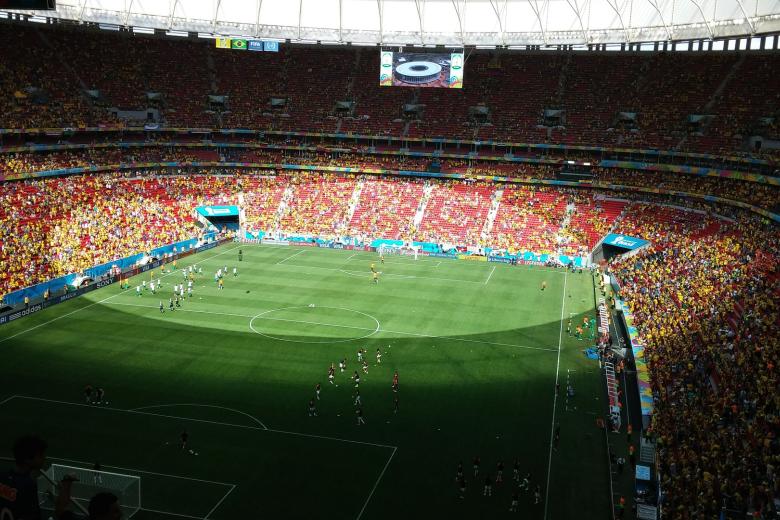England Report, corrupting football (part 3)
Researched and written by Aurelie Wertz. Twenty-eight clubs in the English top four divisions are now substantially owned by overseas investors! Overall, we see a general culture of acceptance or perhaps that of wilful ignorance by the fans regarding the mysterious and multiple complex aspects of financing football.
Similar to the different countries already presented, the football clubs in the UK also have a history of being bought by (foreigners) tycoons. The first major case was back in 2003, when a Russian oil billionaire, Roman Abramovich bought the Chelsea soccer club (Treanor & Finch, 2003). Subsequently, other tycoons have followed the lead and invested in the ownership of English football clubs (Hesse, 2013). The last significant foreign investment into an English club is a case involving the Wolves (in the Championship League), which has been sold to a Chinese invest group, Fosu International in July 2016 (Press Association, 21 July 2016). The group works with with the agent Jorge Mendes who represents José Mourinho and Cristiano Ronaldo (Press Association, 21 July 2016). In total, media have reported that rich foreign investors own about 57% of football clubs in the English Premier League and Championship (Hay, July 22th 20016).
Considering the huge amounts of capital needed to buy out a football club, it is worth pondering the source of the capital that is being invested into these football clubs. Different reasons may lead to making such a choice. For instance, some suggest that vanity could be a motive. Indeed, for very rich tycoon owning an English football club would be an additional luxury and symbol of their wealth (Deloitte, 2016; Head, 2015). Others see the ownership of football clubs as a geopolitical tool as owning a club would enable to have a foot in the country. This would be particularly interesting for smaller and unstable country, such as Qatar (Yueh, 2014). In a similar vein, through the club, the owner becomes important and can use it as a means to access celebrity, notoriety as well as encountering important people (Yueh, 2014). Furthermore, strong ties with the local community and/or passion for the club could encourage to step in as the owner of the club ruling heart over head (Yueh, 2014). However, is this argument still valid for foreign buyers?
Ultimately, the motive of financial gain can frequently be ruled out. Even the important cash back from commercial activities, tickets and advertisements have difficulties in balancing out the extremely high wages and costly transfers as well as pay off the club's debts (Deloitte 2016; Yueh, 2014).
Nonetheless, the transition between a club in the English Premier League and in Championship could be seen as playing the lottery. Indeed, if a club raises from the championship to the premier league, the financial gains are very important, and in turn, could make the investment worthwhile. On the other end, having a club falling from the Premier league to championship could is akin to a financial suicide (Yueh, 2014).
Some researchers/journalists are trying to raise awareness regarding the lack of transparency that surrounds the financial aspect of football (Nelen, 2015). For instance, an index of football clubs has been launched by such a community (see: theoffshoregame.net). The index is based on who owns the club and how many shares (e.g., ownership by an offshore company) as well as the level of secrecy that surrounds the ownership and financing (e.g., the offshore financial center has laws on banking secrecy).
In this light, one could ask if carious hidden motives – financial or perhaps something more sinister – could be behind the willingness of the rich tycoons to buy an (English) football club. Some reasons could be mentioned in this context: For instance, tax avoidance is likely in these purchases. The likelihood is heightened when the clubs are brought from offshore tax havens (Conn, 2015). In a similar vein, conflict of interests and the overall lack of transparency and accountability breeds these tax abuses and criminality (The offshore game, 2016). In addition, money laundering, fraud, and white collar crimes could be linked to the financing of football clubs (Nelen, 2015).
FIFA, International Federation of Association Football, that is supposed to be responsible for the game regulations at the international level has itself been the subject of various corruption scandals in the past years (De Marco, 2016). With regard to the regulations in place, FIFA has delegated the task to the countries. Therefore, national football federations are responsible for their own regulatory system (De Marco, 2016).
Actually, in comparison to other European countries, the English Football Association (FA) has already quite rigorous regulations (De Marco, 2016). First, they organize a “kite-mark” licensing program. The program aims to provide a proper training to football agents (De Marco, 2016).
In addition, England has also implemented a “fit and proper test” for football club potential buyers. The test checks if the potential buyer’s funds are sufficient to keep a football club running (Conn, 2015). Moreover, English companies need to provide a “confirmation statement” once a year as well as identifies “persons of significant control”. In other words, every person in a company that owns more than 25% of the shares and/ or voting rights and/or has the ability to appoint-remove directors and/or exercise an important influence over the company (directly or indirectly) must be declared (The offshore game, 2016). However, further improvements to the regulations could still be done. Indeed, the different tests (i.e., fit and proper test) do not assess and judge how the club ownership is structured (Conn, 2015).
Indeed, for demystifying the problem and avoiding scandals, that smear the game, increased transparency with regard to financing football should be encouraged (De Marco, 2016). Raising awareness around this lack of transparency may already put pressure on football stakeholders to improve and enhance good governance. More precisely, club ownership (e.g., offshore, motives), club finance (e.g., corrupt practices), the different stakeholders (e.g., agents, clients, commissions) as well as the FA (e.g., the regulations in place, accountability) should all undergo more careful scrutiny (The offshore game, October 2016). For example, an independent third party should assess the FA’s regulations and be able to sanctioned when needed (De Marco, 2016). Definitely, having an independent body supervising finances would decrease the likelihood of corruption and hazardous transactions.
Overall, building good governance around sports and football, in particular, would boost the credibility, quality, popularity and integrity of the game (Deloitte, 2016). Moreover, good governance is not opposite to economic growth of a club. On the contrary, it could attract support of more stakeholders (Deloitte, 2016).
In general, the public appear to be far more soft regarding football compared to other sports. Indeed, there is more tolerance – or purposefully ignorance – in accepting the potentially nebulous nature of the investment that is being poured into our football clubs. There are good reasons to be alarmed, from the lack of homogenous and rigorous regulations, the frequent scandals and the purchases by unknown tycoons and offshore companies, and so on (The offshore game, 2015). Meanwhile, it is clear that money and performance are interlinked as the clubs with the most financial backing often seem to retain the services of the best players. It almost seems as if everything is permitted in the name of football and winning so long as the best players make it into the high clubs (De Marco, 2016). Football has become a business for which the ends justify the means (De Marco, 2016) even if rich foreign tycoons strip away the local club spirit and their fans out of the game (Conn, 2015).
Overall, we see a general culture of acceptance or perhaps that of wilful ignorance by the fans regarding the mysterious and multiple complex aspects of financing football (The offshore game, October 2016), but in the end, the real losers are the fans (The offshore game, October 2016). If we want our beautiful game to be uncorrupted, it is high time to raise awareness and mobilize for a fair play game through transparency, accountability, and good governance (The offshore game, September 2016).
This case study was written by Aurelie Wertz as part of the Premium Project on “Corruption in Football.” The Premium Team consists of Teresa Vazquez Lopez (Spain Report), Aurelie Wertz (England Report), Hanna Harnisch (Germany Report), and Marije Ariëns (the Netherlands Report).
Published on Law Blogs Maastricht
Read the 1st blog Introduction
Read the 2nd blog Spain report
Read the 4th blog Germany report
Read the 5th blog Netherlands report
Read the 6th blog Preliminary conclusion
-
Preliminary conclusion
Football for sale: what is the problem, and what are the solutions? Read our previous reports (Spain, England, Germany and the Netherlands) to find out.

-
The Netherlands report, corrupting football (part 5)
Researched and written by Marije Ariëns. For the clubs, accepting foreign investments means more possible room for improvement of the club and more successful transfers. However, it also means there will be less insight into where the money that finances these improvements comes from and through...

-
Spain report - Corrupting football, the beautiful game (part 2)
Researched and written by Teresa Vazquez Lopez. The Spanish football sector is interesting to analyse since Spain is a relatively young democracy whose constitutions usually often reference to sport.
